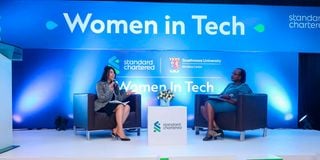Africa needs to re-energise investment in women start-ups

Co-founder of Ndovu Women in Tech Alumni Radhika Bachu and Head of Consumer, Private and Business Banking Standard Chartered Bank Kenya and East Africa Edith Chumba at the launch of the 6th cohort of the Standard Chartered Women in Tech programme on March 28, 2023 in Nairobi.
What you need to know:
- Women remain significantly underrepresented in higher education, specifically in research and innovation ecosystems.
- Women-owned micro, small and medium-sized enterprises report earning only 57 per cent of the income that male business owners earn, while also having fewer employees.
As Africa joins the rest of the world in marking International Women’s Day (IWD) on March 8, policymakers, academics, researchers, activists and leaders in general, reflect on the plight of women across the continent including gains made in women empowerment, lost opportunities, and future actions. This year’s theme, “Count her in: Invest in women. Accelerate progress”, could not be more apt for the African woman.
While there have been some notable gains in a few indicators, overall evidence paints a grim picture of the status of the majority of women across Africa.
Research and start-ups have some of the worst-performing indicators of gender inequality. According to Unesco, women account for a minority of the world’s researchers, with a 2017 study showing women make up only 31 per cent of researchers in Sub-Saharan Africa.
Women remain significantly underrepresented in higher education, specifically in research and innovation ecosystems. This is attributed to the ‘leaky pipe’ syndrome—a constant attrition of women that ends up drastically thinning their numbers higher up in the research ecosystem.
A Unesco study shows women outnumbering men at 53 per cent at the bachelor's and master’s levels, but at the PhD level, they represent only 43 per cent of researchers.
This number drops further at completion of PhD, with women taking far longer to complete their PhDs, with a number dropping out altogether.
Further up, the numbers dip more drastically, where women make up only 27 per cent of permanent staff at flagship universities, 10 percent of members in national science academies on the continent, and only about two per cent of vice-chancellors across the continent.
The problem is compounded by the low investment in research by governments across the continent, which remained stagnant at an average of just about one percent of the GDP (June 2023), but more worryingly for sub-Saharan Africa, the amount dropped from 0.44 per cent to 0.42 per cent.
The business start-up ecosystem in Kenya, and Africa in general, poses almost a similar set of problems for women seeking entrepreneurship. Women-owned businesses are making a significant contribution to the Kenyan economy, yet they are less likely to grow, are smaller, and are twice as likely to be operating from home as male-owned businesses.
Furthermore, women-owned micro, small and medium-sized enterprises (MSMEs), report earning only 57 per cent of the income that male business owners earn, while also having fewer employees.
In Africa, the performance of female-owned businesses consistently lags behind that of male-owned businesses. They have fewer employees, lower-than-average sales, and less value-added products. There exists a massive gender gap in formal business ownership in Africa. In Kenya, while women’s entrepreneurship is common, only 31.4 percent of formal businesses are owned by women. In Nigeria, women only own 20 percent of formal businesses, and only 12 percent of appointed directors to boards are women.
One of the greatest challenges women entrepreneurs face today is lack of access to finance. A huge financing gap exists for African women across business value chains, with about 56 percent of women entrepreneurs in Sub-Saharan Africa citing either unprofitability or lack of finances as a reason for closing down their businesses.
The World Bank identifies nine key obstacles holding back women start-ups and business performance in Africa. They range from legal discrimination to social norms, education and skills gaps, risk of gender-based violence, access to finance and assets ownership. "Count Her In" aptly complements efforts by various entities over the years—as well as this year—to support women's entrepreneurship through a variety of interventions.
Ms Tunnen is the communications lead, Mawazo Institute. [email protected].





